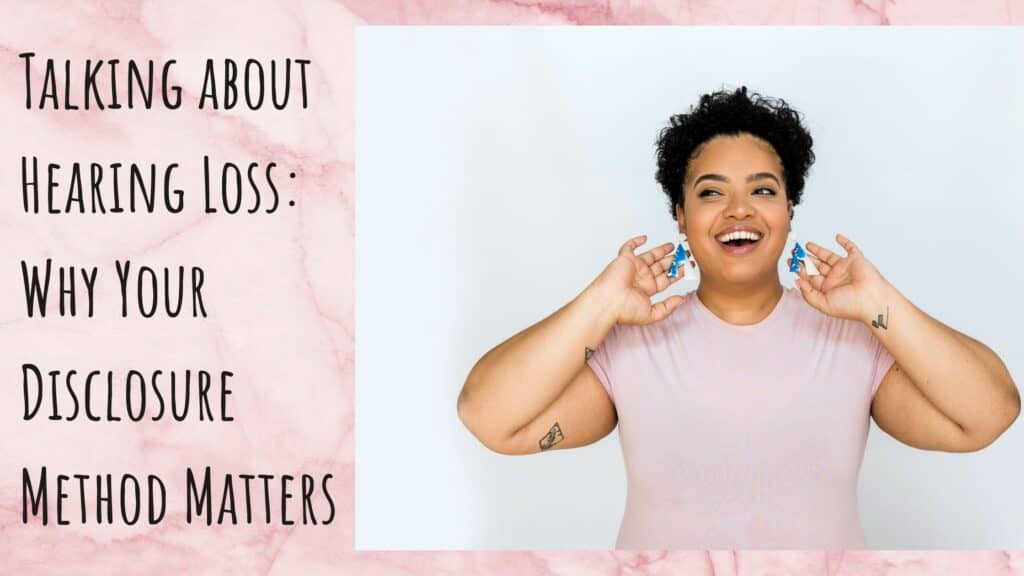Are you planning to tell a loved one about your hearing loss? Maybe you’ve noticed some early signs of hearing loss and you’re ready to confide in someone. Talking about your hearing loss matters. And one study shows that how you disclose your hearing loss can have a big impact on your hearing health as well as your overall health and wellbeing.
Why You Should Talk About Your Hearing Loss
You might not want to open up about your hearing loss. You may be worried that admitting you have hearing loss will make you seem older. However, hearing loss can affect anyone. Approximately 50 million Americans of all ages have hearing loss. Talking about hearing loss for the first time might be hard, but after you start the conversation, you’ll realize how many others also have hearing loss. You can get the support you need and treat your hearing loss to enjoy better health outcomes.
Disclosure Methods Matter
Are you wondering about how to tell your loved ones about your hearing loss? One study from 2016 had 337 people complete a questionnaire about their disclosure methods. They found that most people used one of three disclosure methods to talk to their loved ones about hearing loss. The disclosure method used was related to different health outcomes, quality of life, and satisfaction in relationships and communication.
Non-Disclosure Method
The least helpful disclosure method is the non-disclosure method. Men were more likely than women to use this style. Non-disclosers avoided talking about their hearing loss. They would often blame someone else, saying things like “Why can’t you speak up?” or “Stop mumbling!”
Adults who did not disclose their hearing loss had poor health outcomes. They were unlikely to treat their hearing loss, and they did not receive a lot of support from family and friends. Those who choose not to disclose their hearing loss, or who may not be ready to face their hearing loss, have a much harder time communicating. They are more likely to feel frustrated, isolated, and alone.
Basic Disclosure Method
Some adults in the study felt ready to talk about their hearing loss with close family members. They would tell a loved one “I’m having trouble hearing” or “I can’t hear very well in my left ear.” While these adults did talk about their hearing loss, they did not know what kind of support they needed.
Only some of these adults treat their hearing loss or get support from family and friends. When only a few people know about their hearing loss, not everyone will be ready to help them hear.
Multipurpose Disclosure Method
Finally, some adults in the study used the multipurpose disclosure method. They were willing to talk about their hearing loss and told most family and friends about their hearing loss. They were also more aware of their needs and how others could help them hear. Multipurpose disclosure may say things like “Can you turn off the TV while we talk?” or “Can you rephrase what you just said?”
Adults who use multipurpose disclosure and disclose their hearing loss to their family and friends have the best health outcomes. They’re the most likely to have hearing aids and enjoy better hearing. They also have more support from loved ones, better communication, and increased relationship satisfaction.
Talking About Hearing Loss
Think about the sounds you’re missing. Are you ready to talk about your hearing loss? Disclosing your hearing loss can improve your overall health and quality of life. If you choose to be a multipurpose disclosure, you can get even more support from your loved ones, and break down the stigma that surrounds hearing loss.
If you’re ready to talk about hearing loss, we’re here to listen. Our skilled hearing healthcare professionals will help you find out more about your hearing loss and hearing needs. We can also help you learn how to disclose your hearing loss to loved ones and ask for the support you need.
We’ll start with a hearing test to find out more about your unique hearing needs. Then we’ll help you find the perfect hearing devices to help you hear. You shouldn’t have to live with untreated hearing loss! Visit Professional Audiology today to explore all your hearing aid options.





